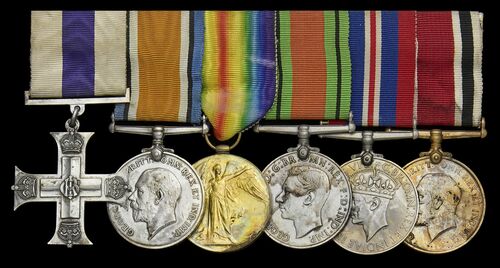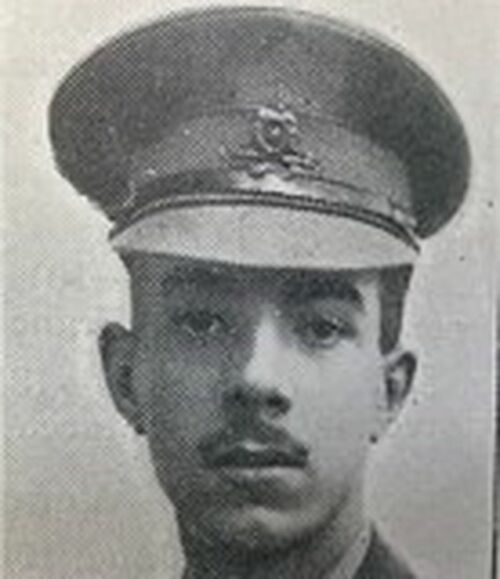Auction: 24001 - Orders, Decorations and Medals
Lot: 177
Sold by Order of a Direct Descendant
‘The trenches as a whole are in a horrible condition, mud and water up to and sometimes over the knees. I had several narrow escapes. Once as I stepped out to go down to the dug-out, a 5’0 shell burst behind the wall (one sand-bag thick); luckily it did not tip the wall over. Another time I was calling down to the telephonist when a bit hit me in the back; it was nearly spent, however, or I might have had a nasty wound. (I have kept the bit). All day and most of the night the Huns kept shelling and the Observation Post had a bad time. At midnight Sunday a terrific Bombardment took place by our artillery, under cover of which our wounded were brought in.’
(An article entitled In an Observation Post in The Leopard written by 2nd Lieutenant Eric Ruffell, Royal Garrison Artillery)
A superb 1917 M.C. group of six awarded to Major E. Ruffell, Royal Garrison Artillery, an Old Tonbridgian who wrote a remarkable account of his experiences as an observer in the Great War
Military Cross, G.V.R., the reverse engraved '2nd Lt. Eric Ruffell R.G.A. 17th July 1917.'; British War and Victory Medals (Major. E, Ruffell.); Defence and War Medals 1939-45; Special Constabulary L.S. & G.C., G.V.R. (Eric Ruffell), mounted as worn, contact wear overall, very fine (6)
M.C. London Gazette 18 July 1918:
‘For conspicuous gallantry and devotion to duty in rescuing and attending to the wounded of his battery on two occasions when under heavy shell fire. His coolness and promptness in arranging for their removal set a splendid example to all, and had a most excellent effect upon the discipline and moral of his battery.’
Eric Ruffell was born at Tunbridge Wells, Kent on 4 April 1897, the son of William and Francis Ruffell at 59 Mount Pleasant Road, Tunbridge Wells. His father was a local jeweller and was able to afford good schooling for his son, sending him first to The Skinner’s School and later Tonbridge School after which he joined the Royal Military Academy in 1915.
Swiftly commissioned 2nd Lieutenant Ruffell entered the war at some stage in early 1916, an article in the Sussex Daily News written in July 1917 refers, stating:
‘He quickly secured his commission in the R.G.A., and last year went over to France, where he has now seen nearly 18 months’ active service. Although only just 20 years of age he was recently gazette as Acting Captain and the award [of the M.C.] was made in recognition of his excellent work in the dangerous post of a forward observation officer.’
Ruffell was indeed promoted Captain on 1 July 1917 and later Major on 14 September of that same year. He outlined his work as an observer in an article in his school magazine The Leopard quoted earlier. He writes further stating:
‘From the top of my Observation Post, I have an excellent view of the village and wood. The wood, before we stated, was very thick, but now one can see clean through it; most of the trees are down; the remainder look like telegraph poles. The village is practically nothing but a mass of bricks. I saw several bombing parties start out but I am afraid none of them ever returned: the Hun has his usual hidden machine guns. The worst thing for the infantry, however is, the high explosive shrapnel. One trench was absolutely no more- I went along it- most of the way one had to bend double or bolt for it. Of course the trenches are full of the dead.’
Confirmed Major after the war on 3 August 1919 he remained with the Military. Ruffell did in fact leave the army after the war, although he did retain his rank and service in the Territorial Army while qualifying as an Optician in Civilian life. Awarded the Freedom of the City of London in 1925 as party of The Worshipful Company of Spectacle Makers, going into business with his father the jewellers gained an Opticians office as well. He was still an officer in the Territorial Army on the outbreak of the Second World War.
Returning to service Ruffell is listed as a Major with the Royal Artillery between 1941-1945, he ended the war having seen home service as a fire-commander for the East Coast. Relinquishing his commission due to age on 21 June 1947 he returned to Tonbridge where he remained as an Optician, eventually closing to jewellers’ side of the family business to focus upon the former profession. Ruffell also remained in touch with his old school, joining the board of Governors in 1950.
Retiring to Tonbridge he died there on 18 August 1966; sold together with copied research including census data, London Gazette entries and a photograph as well as a scanned freedom of the city of London document and extracts from The Leopard and the Sussex Daily News along with an original medal slip of issue for his Defence and War Medals.
For his miniature awards see Lot 359.
Subject to 20% VAT on Buyer’s Premium. For more information please view Terms and Conditions for Buyers.
Sold for
£1,300
Starting price
£600







